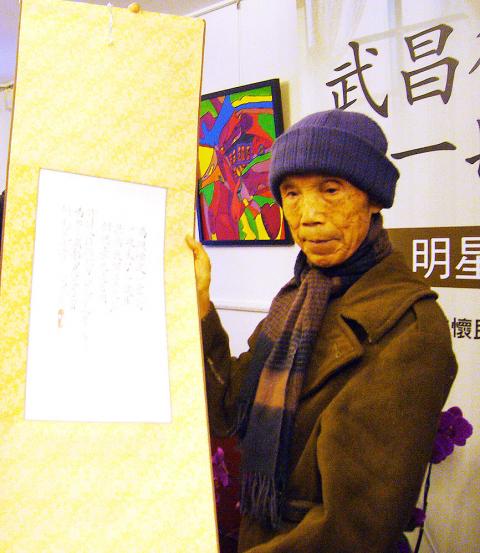Renowned poet Chou Meng-tieh (周夢蝶) died in New Taipei City on Thursday at the age of 92 from complications associated with pneumonia.
Along with his poetry, Chou was known for his monk-like habits, which he adopted after immersing himself in Buddhism later in life.
Born in China’s Henan Province in December, 1921, Chou’s original name was Chou Chi-shu (周起述).

Photo: CNA
During the Chinese Civil War, he joined the Chinese Nationalist Party (KMT) youth corps and came to Taiwan in 1948 after the KMT lost the Chinese civil war.
He was separated from his family, including his grandparents, mother, wife and children, who all remained in China.
However, after five decades apart, Chou revisited his hometown.
At 32, Chou began to write poetry, which was published in the literary pages of Central Daily News and Young Soldier Daily (the forerunner of Youth Daily News).
In the 1950s, Chou became a member of the Blue Star Poetry Society (藍星詩社), an influential gathering of mostly Chinese poets and writers.
In 1959, Chou began selling poetry and literature in front of Cafe Astoria on Wuchang Street (武昌街) in central Taipei, which was a favorite hangout of intellectuals at the time.
That year, he published a collection of poems, entitled Gudu Guo (孤獨國, Lonely Land), which is his most well-known work.
Later in life, Chou delved into Buddhism and took up Zen meditation.
A picture of Chou sitting on a street corner, quietly meditating, became one of the symbolic images of an era, showing a literary man’s solitude against the backdrop of Taipei’s hustle and bustle.
Inspired by Confucian tradition and philosophy, Chou did not pursue material gains and lived a simple life, alone, throughout his adult life.
As a poet, Chou picked up the nom de plume of “Meng-tieh” (夢蝶), which means the “dream butterfly.”
He said it was inspired by Taoist master philosopher Chuang-Tze’s (莊子) famous tale about a butterfly dream.
The name is reflects his yearning for freedom, as well as his frugal, restrained way of living.
Highly regarded in Taiwan’s cultural circles, Chou was named the first literature laureate of the National Culture and Arts Foundation in 1997.
Hung Chung-hao (洪崇豪), spokesperson for the Buddhist Tzu Chi General Hospital in New Taipei City’s Xinzhuang District (新莊) where Chou was treated, said that Chou did not have any relatives in Taiwan.
Instead, many of his student followers are helping to arrange the funeral in accordance with Buddhist traditions.
On the news of Chou’s death, the Ministry of Culture released a statement and requested that the Presidential Office issue posthumous honors for Chou.

An essay competition jointly organized by a local writing society and a publisher affiliated with the Chinese Communist Party (CCP) might have contravened the Act Governing Relations Between the People of the Taiwan Area and the Mainland Area (臺灣地區與大陸地區人民關係條例), the Mainland Affairs Council (MAC) said on Thursday. “In this case, the partner organization is clearly an agency under the CCP’s Fujian Provincial Committee,” MAC Deputy Minister and spokesperson Liang Wen-chieh (梁文傑) said at a news briefing in Taipei. “It also involves bringing Taiwanese students to China with all-expenses-paid arrangements to attend award ceremonies and camps,” Liang said. Those two “characteristics” are typically sufficient

A magnitude 5.9 earthquake that struck about 33km off the coast of Hualien City was the "main shock" in a series of quakes in the area, with aftershocks expected over the next three days, the Central Weather Administration (CWA) said yesterday. Prior to the magnitude 5.9 quake shaking most of Taiwan at 6:53pm yesterday, six other earthquakes stronger than a magnitude of 4, starting with a magnitude 5.5 quake at 6:09pm, occurred in the area. CWA Seismological Center Director Wu Chien-fu (吳健富) confirmed that the quakes were all part of the same series and that the magnitude 5.5 temblor was

The brilliant blue waters, thick foliage and bucolic atmosphere on this seemingly idyllic archipelago deep in the Pacific Ocean belie the key role it now plays in a titanic geopolitical struggle. Palau is again on the front line as China, and the US and its allies prepare their forces in an intensifying contest for control over the Asia-Pacific region. The democratic nation of just 17,000 people hosts US-controlled airstrips and soon-to-be-completed radar installations that the US military describes as “critical” to monitoring vast swathes of water and airspace. It is also a key piece of the second island chain, a string of

The Central Weather Administration has issued a heat alert for southeastern Taiwan, warning of temperatures as high as 36°C today, while alerting some coastal areas of strong winds later in the day. Kaohsiung’s Neimen District (內門) and Pingtung County’s Neipu Township (內埔) are under an orange heat alert, which warns of temperatures as high as 36°C for three consecutive days, the CWA said, citing southwest winds. The heat would also extend to Tainan’s Nansi (楠西) and Yujing (玉井) districts, as well as Pingtung’s Gaoshu (高樹), Yanpu (鹽埔) and Majia (瑪家) townships, it said, forecasting highs of up to 36°C in those areas